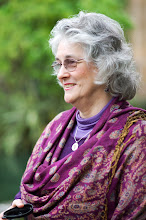Friday, May 13, 2011
Interfaith Day of Prayer, 2011
Every May my local Marin Interfaith Council, of which I am the sole Pagan member (and an active one), presents an interfaith prayer breakfast.[1] The date corresponds with the National Day of Prayer (36 U.S.C. § 119) breakfast in Washington, DC, held on the first Thursday in May, beginning in 1952 in the Truman administration. The fact that the National Day of Prayer is exclusively Christian rather than being inclusive of other religions and yet presumes to call itself national offends me, as it does not reflect the religious diversity of our nation.
We have three speakers from three different religions; each tells us a bit about her or his religion, and then shares a prayer, song, chant, meditation, or some other experience. In the past we've had a Sufi, another kind of Muslim, Rabbis from different branches of Judaism, a Pentecostal, a Brahma Kumari (a type of Hinduism), Roman Catholic, Vedanta Society (also Hindu), Religious Science, ministers of other Protestant denominations, Eastern Orthodox, Zen and other branches of Buddhism; you name it, we have it here in Marin.
This year the Rev. Carol Myokai Himaka, a teacher Jodo Shinshu Buddhism from Enmanji Buddhist Temple in Sebastopol, and Rabbi Stacy Friedman from Congregation Rodef Shalom in San Rafael, were joined by the first representative from an Earth-based spirituality ever to speak at this annual event, Gardnerian Wiccan Don Frew, one of CoG's interfaith representatives, from Berkeley. I'm given to understand that our Interfaith Celebrations Team made this choice, and I'm grateful to them for having done so.
In 1997, when Starhawk's and my book, The Pagan Book of Living and Dying, was launched under the sponsorship of the late Shambala Bookstore in Berkeley, Don Frew introduced me. Now, in 2011, I had the pleasure of introducing Don to my friends and colleagues in MIC. What a treat!
Carol spoke about the founding of Buddhism in the 6th Century BCE by Siddartha Gautama, the Buddha, as well as about some of the different schools of Buddhism. This being a rather complicated matter, and time being limited, she went over time and had to conclude rather abruptly.
Since we were behind schedule by now, Don spoke succinctly about the revival of Witchcraft and Pagan religions in the mid-20th Century CE. Then he had everyone stand at their round tables and hold hands while he led us in a tree of life meditation. This is such a perfect contribution to this kind of event: everyone loves trees and can relate to feeling the sun on her leaves and the solidity of the Earth beneath. They loved it! They applauded. They wanted more. And I was so proud and pleased.
Stacy's presentation was also shorter than it might have been. She passed out sheets containing some Jewish prayers, printed in Hebrew, transliterated, and translated, so we could see each prayer in three forms. We recited them together.
We who work in the field of interfaith encourage all interested people to come to our events, especially the annual interfaith prayer breakfast. Often the presenters have co-religionists who come to support their representatives. But we have few.
Unfortunately, events of this nature that take place in the daytime, when most people work, preclude much in the way of Pagan participation. I saturated the local Pagan networks with the announcement of this event (as I do for most MIC events) in an effort to solicite Pagan participation. For all of that, I'm grateful that Hawk and Thermal from North Bay Reclaiming were able to come, because the four of us (Hawk, Thermal, Don and me) were the only Pagans in the room. Why is this? It's because most other religions, mainstream or not, have people whose job it is to participate in interfaith and other activities. They have paid clergy. I'm not making an argument one way or another for our creating a clergy class within Paganism, at least not here and now. What I am saying is that this is a difference that distinguishes us, and one that makes Pagan participation in such activities minimal. In order to do so, one needs either money (sponsorship of an organization, employment by an organization, or independent funds) or to be retired. I am happy to be able to participate because I'm past retirement age and have no job (although I welcome opportunities to earn income).[2] For interfaith representation that involves greater expenditures, I gratefully receive stipend support from CoG. So do other CoG interfaith representatives at times, but it seems that most Pagan organizations don't give interfaith involvement a very high priority. I am happy to be disproven of that assertion.
In any case, I expect to return to the next meeting of MIC's Justice Advocacy Team, the group in which I participate the most, to colleagues who now have a clearer and richer understanding of my religion. I tip my pointy black hat to Don, and the Interfaith Celebrations Team, for this valuable contribution -- to MIC and to the world.
[1] Reports from previous MIC interfaith prayer breakfasts here.
[2] As my friend Victoria says, "lettuce pray" that Social Security holds out. I sing the praises of FDR for the many implementations of the New Deal.
Subscribe to:
Post Comments (Atom)


1 comment:
Nice article, thanks for the information.
Post a Comment